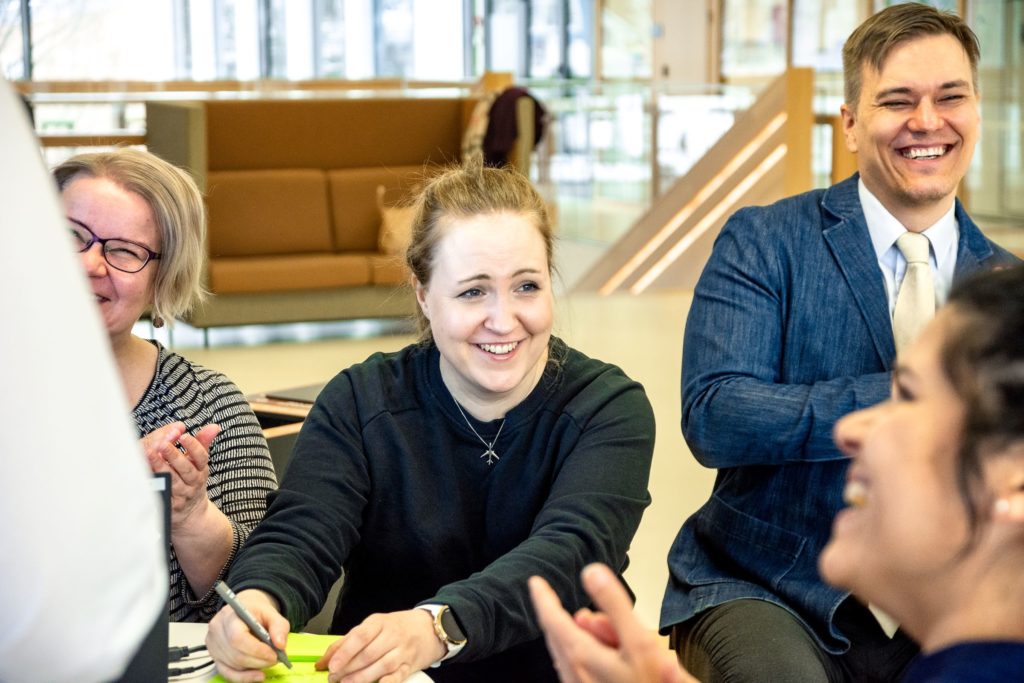The call for proposals was open for collaboration in Africa, China, and India. The call invited academic and teaching staff, doctoral and post-doc researchers, as well as students to submit proposals seeking to:
- co-create research-based solutions to global education challenges,
- increase meaningful and mutual partnerships between Finnish HEIs and their partners in African countries, in China and in India, and
- inspire and initiate attractive internationalisation measures in Finnish higher education institutions.

GINTL wants to contribute towards achieving the Sustainable Development Goal 4: “Ensuring inclusive and equitable quality education and promote lifelong learning opportunities for all”. The GINTL Call for Proposals is now open to initiate, enhance and strengthen collaboration in teaching, learning and teacher education with African, Chinese and Indian higher education institutions.
The GINTL member institutions decide about funding internally. At the University of Helsinki, GINTL is coordinated at the Faculty of Educational Sciences of the University of Helsinki, and the funding was opened for all University of Helsinki faculties.
Five initiatives were granted seed funding and six initiatives were granted project funding. All these projects support GINTL goals as well as the overall University of Helsinki internationalisation goals. There were more applications than could be awarded.
We thank all applicants!
The call can be viewed here (University of Helsinki intranet):
Applications granted project funding
- “Education for sustainable and rational approaches to the use of medicinal plants in Benin: Co-constructive pedagogical strategy, research, and dissemination of good practices”
Leena Hanski | University of Helsinki, Faculty of Pharmacy - “Finland-Ghana collaboration in hybrid teacher education” (CocoEd)
Hille Janhonen-Abruquah | University of Helsinki, Faculty of Educational Sciences - “Learning to design – Designing to learn” (LDDL)
Anni Loukomies | University of Helsinki, Faculty of Educational Sciences - “New directions in development studies and sustainability: Reconsidering global challenges and local realities”
Barry Gills | University of Helsinki, Faculty of Social Sciences - “Research-based and future-oriented curriculum review and development for teacher education in Kenya” (REFORD)
Seija Karppinen | University of Helsinki, Faculty of Educational Sciences - “The developmental dynamics in motor and early numeracy skills in children who are at risk of mathematical learning difficulties – A cross-cultural comparison across African countries” (AEN-Africa)
Pirjo Aunio | University of Helsinki, Faculty of Educational Sciences
Project descriptions
Education for sustainable and rational approach to the use of medicinal plants in Benin:
Co-constructive pedagogical strategy, research, and dissemination of good practices
Phytomedicine is an integral part of the healthcare system in many African countries, and in Benin 80% of population rely on medicinal plants as their primary source of medication. Our project is based on the idea that establishing a sustainable and rational approach to the use of medicinal plants in Benin requires complementary activities targeting both higher education on phytomedicinal research and the popularisation of good practices in medicinal plants use among traditional healers.
Our four-step implementation plan will allow us to produce more precise data on training needs (step one), before strengthening teachers’ pedagogical practices (step 2), then strengthening researchers working in the field of the valorisation of medicinal plants (step 3) and finally impacting the actors of traditional medicine (step 4).
Overall, these activities aim to promote internalization of teachers, researchers and students within the participating institutes and to promote long-lasting research and education collaborations between them.
Principal investigator
Leena Hanski
University of Helsinki,
Faculty of Pharmacy
Involved higher education institutions
- University of Helsinki
- University of Eastern Finland
- University of Abomey-Calawi
Finland-Ghana collaboration in hybrid teacher education (CocoEd)
The CocoEd project develops research-based hybrid teaching and learning in Ghanaian teacher education. With digital technologies becoming powerful tools to enable remote communication, collaboration and learning, there is more flexibility to organise both virtual and face-to-face teaching and learning according to specific needs and the changing situation. This flexibility is especially important in areas lacking qualified teachers, but also in emergencies such as pandemics and political conflicts.
The project seeks to research and develop feasible and practical alternative means for remote learning by paying attention that poor internet connection is a reality in Ghana. A Mini-ÅAU-Campus initiative by Åbo Akademi University provides an interesting research context to test, try, and research new solutions for hybrid pedagogy. The CocoEd project re-establishes, widens and strengthens the long-term collaboration between the University of Helsinki, Åbo Akademi University, and the University of Cape Coast, Ghana.
Principal investigator
Hille Janhonen-Abruquah
University of Helsinki,
Faculty of Educational Sciences
Involved higher education institutions
- University of Helsinki
- Åbo Akademi University
- University of Cape Coast
Learning to design – Designing to learn (LDDL)
The “Learning to design – Designing to learn” (LDDL) project is a research collaboration between the University of Helsinki and the University of Johannesburg and aims to ensure inclusive and equitable quality education as well as to promote continuous learning opportunities for all. We will conduct research on pupils learning in post 4IR era through the design of digital artifacts, such as Lego-robots, videoclips, and reports in the context of science, technology, engineering, and mathematics (STEM) teaching and learning.
The proposed project will support researchers and teachers in research-practice partnership (RPP) design STEM project-based learning (PBL) modules, which engage primary pupils in designing digital artifacts in order to research pupils’ design processes and their learning of transversal and sustainability competences, especially creative, critical and computational thinking skills in low-income areas of South Africa and in Finland. RPP will support researchers and teachers learning and the adoption of the designed innovative teaching modules.
Principal investigator
Anni Loukomies
University of Helsinki,
Faculty of Educational Sciences
Involved higher education institutions
- University of Helsinki
- University of Turku
- University of Johannesburg
New directions in development studies and sustainability: Reconsidering global challenges and local realities
The “New directions in development studies and sustainability: Reconsidering global challenges and local realities” project consists of collaboratively designed and delivered intensive courses, entailing exchange of development studies doctoral students and staff. It focuses on theoretical knowledge, writing and research skills as well as curriculum design collaboration, to provide significant long-term benefits to all partner institutions. The project structure consists of two in-person intensive course exchanges, two virtual exchanges, two virtual seminars as well as routine virtual team collaboration on curriculum development and coordination, joint research, and publication activities.
Current paradigms and curricula in development studies around the world have become outdated and detached from global dynamics and local realities. This is clear when considering the United Nations’ Sustainable Development Goals (SDGs) and the African Union’s Agenda 2063. Analysis and understanding of the relationship between global challenges and localities is more relevant now than ever. The courses address topics proposed by the African partner HEIs, including: localisation of SDGs; multilateralism and recolonisation of Africa; climate change and agriculture; economic partnerships, trade, and international cooperation.
Principal investigator
Barry Gills
University of Helsinki,
Faculty of Social Sciences
Involved higher education institutions
- University of Helsinki
- University of Jyväskylä
- University of Zambia
- University of Dodoma
- University of Dar es Salaam
Research-based and future-oriented curriculum review and development for teacher education in Kenya (REFORD)
The REFORD Project refers to “research-based and future-oriented curriculum review and development for teacher education” at the University of Nairobi and Strathmore University, Nairobi, Kenya. It aims to support students to acquire skills needed in 21st century life and the labour market. The project curriculum will align with the Competency Based Curriculum (CBC), launched for basic education in Kenya in 2017. The current focus is on rolling out CBC in higher education institutions and teacher education.
The research to be conducted under the proposed project will specifically strengthen the designing of curricula, improve the quality of delivery of teacher preparation programmes, and thus, strengthen the preparedness of the higher education institutions to implement the CBC.
The future horizon is changing constantly. Education in the Global South must meet aspirations of sustainability. To expedite the achievement of Sustainable Development Goal 4 (SDG 4), educational structures need to provide relevant competences, models, and a future-oriented mindset that sustains our 21st century lives.
Principal investigator
Seija Karppinen
University of Helsinki,
Faculty of Educational Sciences
Involved higher education institutions
- University of Helsinki
- University of Turku
- University of Nairobi
- Strathmore University
The developmental dynamics in motor and early numeracy skills in children who are at risk of mathematical learning difficulties – A cross-cultural comparison across African countries (AEN-Africa)
The “Active early numeracy in Africa” project will produce new scientific knowledge by investigating the development dynamics of early numeracy and motor skills learning among young African children. There is a growing learning crisis in African countries, thus targeted instruction and structured cost-effective pedagogy strategies are needed.
To answer this, we develop and test the effectiveness of 8-weeks interventions (combined early numeracy and motor skills, motor skills, and an early numeracy intervention) with 180 children aged 5-6 years, who are performing low in early numeracy, to prevent mathematical learning difficulties. We control individual variation in executive function, language, fine motor skills, and socioeconomic variables. We collect a longitudinal sample with 600 children, measuring early numeracy, motor, language, executive functions skills, and physical activity.
Based on the results, and with our teacher-researcher ecosystem, we develop open access materials and support for teachers and other stakeholders, related to early numeracy learning and learning difficulties in Africa.
Principal investigator
Pirjo Aunio
University of Helsinki,
Faculty of Educational Sciences
Involved higher education institutions
- University of Helsinki
- University of Jyväskylä
- Åbo Akademi University
- University of Johannesburg
Applications granted seed funding
- “Changing teacher education in India and Finland: Focusing on sustainability issues through humanities and arts”
Hannele Cantell | University of Helsinki, Faculty of Educational Sciences - “Knowledge of interculturality ‘otherwise’: Developing a research-based international partnership between universities in China, Finland, and Morocco”
Jun Peng | University of Helsinki, Faculty of Educational Sciences - “Partnership dialogues – Elements of good partnerships”
Meeri Tiensuu | Finnish University Partnership for International Development (UniPID) | University of Helsinki, Faculty of Agriculture and Forestry - “Teacher education for social justice in the post-pandemic era: Examples from China and Finland”
Xiaoxu Liu | University of Helsinki, Faculty of Educational Sciences - “Towards high quality and equal teacher education in Somalia”
Heidi Krzywacki | University of Helsinki, Faculty of Educational Sciences
Seed funding project descriptions
Changing teacher education in India and Finland: Focusing on sustainability issues through humanities and arts
The idea of this project is to create new models of teacher education, together with Indian colleagues. The aim is to strengthen the understanding of education and pedagogical realities and needs of the Global South, especially Indian, perspectives. On the Finnish side, there is a strong need to develop global and sustainability education in teacher education.
Later, if funded, the project goal is to conduct workshops, create distant teaching programmes and organise teacher as well as student mobility. These activities will concentrate both in the university as well as on a grass root level, especially in sustainability, humanities, and arts.
Principal investigator
Hannele Cantell
University of Helsinki,
Faculty of Educational Sciences
Involved higher education institutions
- University of Helsinki
- Aalto University
- University of Jyväskylä
- Azim Premji University
Knowledge of interculturality ‘otherwise’: Developing a research-based international partnership between universities in China, Finland, and Morocco
Knowledge of interculturality is often too ‘Euro- and western-centric’ in global scholarship and education, leaving little space for the Global South to speak in its own (negotiated) terms about the notion.
Based on our former GINTL online exchange project between universities in China and Finland, this research-based international cooperation links up scholars and students from different parts of the world (China, Finland, and Morocco) to ‘expand the horizons of knowledge production’ about interculturality.
A series of videos will be produced by world experts from the participating institutions about interculturality to help students unthink and rethink their knowledge of the topic in long-term virtual exchanges. This important project thus explores ways of rebalancing power imbalances between Global North and Global South voices in the production of knowledge about interculturality ‘otherwise’.
Principal investigator
Jun Peng
University of Helsinki,
Faculty of Educational Sciences
Involved higher education institutions
- University of Helsinki
- University of Jyväskylä
- Central South University
- Mohammed the Fifth University
Partnership dialogues – Elements of good partnerships
The goal of this research collaboration is to analyse challenges and identify opportunities in global academic partnerships and their development. To do so, UniPID together with GINTL, analyses data from previous joint initiatives to foster responsible and equitable partnerships. The data includes the material from the stakeholder dialogue event organised on 19 May 2022 and answers to the questionnaire created in preparation of the dialogue event. Additionally, the team will organise a focus group interview with scholars from Finnish and African higher education institutions to discuss, verify and further develop the outcomes of the preliminary analysis.
As a final product of the initiative, one to two academic articles and complementary news articles as well as blog posts will be published. A public presentation will be held to communicate the research findings and the lessons learned from the collaboration. This initiative will contribute to national discussions on partnership development, especially with Global South partners.
Principal investigator
Meeri Tiensuu
Finnish University Partnership for International Development (UniPID), University of Helsinki
Involved institutes and higher education institutions
- Finnish University Partnership for International Development (UniPID), University of Helsinki
- University of Helsinki
- Global Innovation Network for Teaching and Learning (GINTL)
- University of Namibia
- University of Oulu
Teacher education for social justice in the post-pandemic era: Examples from China and Finland
Educational inequality has become a persistent and complex international issue nowadays. Discrepancies and gaps exist between economic, regional, gender, racial/ethnic, and language backgrounds regarding educational opportunities and outcomes. Teacher education with a stand on social justice and diversity prepares teachers and creates contexts to effect real change towards attaining a vision of a more just education and society.
This project tries to explore how to prepare future teachers to contribute to reducing inequality in education. Three specific tasks are going to be addressed in this project: (1) conceptualising the broad problems of educational inequality and the role of teacher education in challenging these problems in the Finnish and Chinese contexts; (2) exploring the nature of “practice for equality,” especially focus on the training mode of the teacher education; (3) designing teacher education curricula and program structures that are equality-centered and characterising particular local histories and contexts.
Principal investigator
Xiaoxu Liu
University of Helsinki,
Faculty of Educational Sciences
Involved higher education institutions
- University of Helsinki
- University of Jyväskylä
- Åbo Akademi University
- Hangzhou Normal University
- Hebei Normal University
Towards high quality and equal teacher education in Somalia
This project was created to continue the development of teacher education in Somalia. The development work started at Somali National University (SNU) with the renewal of its Teacher Education Programme in 2018. This initiative is to widen cooperation among teacher educators and to initiate a network among other Somali higher education institutions involved with teacher education. The initiative also aims to find ways to support professional development and collaboration among teacher educators. Teaching practice and school collaboration require a special focus in the future. In addition, educational equity is in scope in order to better understand the current challenges in education. The main activity in the project is a systematic inquiry carried out by various stakeholders. Two workshops will be organised for an opportunity to learn about specific teacher education topics, and for sharing of ideas and co-creation of knowledge among interest groups.
Principal investigator
Heidi Krzywacki
University of Helsinki,
Faculty of Educational Sciences
Involved higher education institutions
- University of Helsinki
- University of Turku
- Somali National University
- East Africa University













